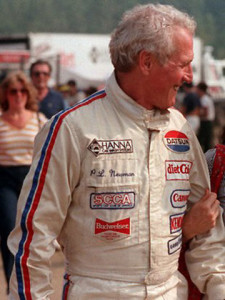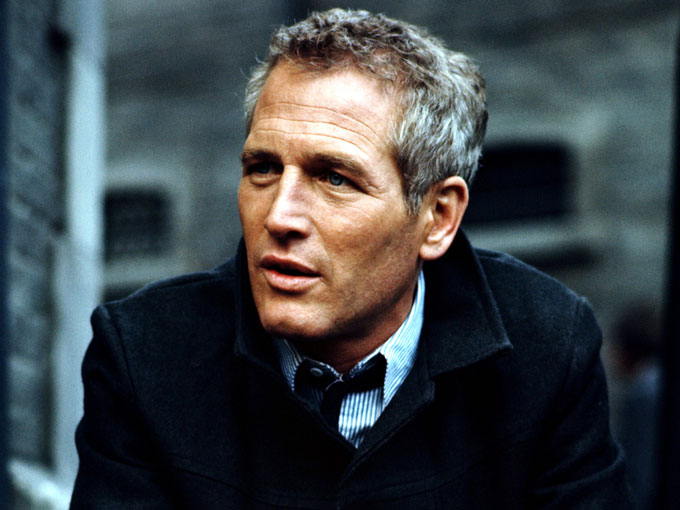Now and then I wonder what Steinbeck’s Of Mice and Men would have looked like staged by Paul Newman, how it would have felt. Would George have taken on a swagger? Would Curley’s wife have been even sexier? Newman after all had a way with exotic characters, whether Ben Quick or Brick or Cool Hand Luke or Fast Eddie Felson.
Paul Newman had a way with exotic characters, whether Ben Quick or Brick or Cool Hand Luke or Fast Eddie Felson.
Before assuming Newman might have exaggerated or distorted Steinbeck’s earthier Lennie or Slim, it’s good to remember the Westport Country Playhouse production of Thornton Wilder’s Our Town. Newman’s folksy Stage Manager couldn’t have been more sagely understated. That was in 2003.
By 2007 Newman was dying and knew he didn’t have much work left in him. The fact that he chose to direct Of Mice and Men at Westport–in what would have been his theater directing debut at age 81–was certainly a deep bow to Steinbeck. The play was to open in mid-2008, but Newman’s health worsened precipitously. He stepped down from the production on May 23.
The fact that he chose to direct ‘Of Mice and Men’ at Westport–in what would have been his theater directing debut at age 81–was certainly a deep bow to Steinbeck.
I was disappointed–I wanted to see what he would have done with it. While I knew I couldn’t make it to Westport to see the production, I figured it would be filmed, as Our Town had been for public television showing. Newman died several months later, in September 2008.
Newman’s Challenge: “Where ya’ gonna send the dime?”
I’d met Paul Newman two decades earlier. It was 1987. I was writing sports for the Monterey Herald, and he had come to Monterey to race at the Laguna Seca racetrack. We talked cars and speed, then the conversation turned to theater and film. He mentioned he would soon be editing a film version of Tennessee Williams’ The Glass Menagerie starring his wife, Joanne Woodward.
I’d met Newman two decades earlier. I was writing for the Monterey Herald, and he had come to Monterey to race at the Laguna Seca racetrack.
I have no idea why, but I said, ”Well, it’s a great play but don’t you think it’s been done too often?’’
He stared at me and said slowly and clearly, as if I was standing there talking to Chance Wayne throwing back another shot of bourbon, “It’ll knock your socks off–and I’ll bet ya’ a dime.’’
About then other reporters moved in and I said goodbye. I’d only gone a short way when Newman called after: “Where ya’ gonna send the dime?’’
I’d only gone a short way when Newman called after: ‘Where ya’ gonna send the dime?’
The reporters stepped aside as he jotted his address on a scrap of paper. My wife Nancy and I saw the film several months later. Knocked our socks off. I wanted to send him the dime but couldn’t find the scrap of paper with his address–and have not come across it to this day.
The reporters stepped aside as he jotted his address on a scrap of paper.
I’ve never felt so guilty over nonpayment of anything. I knew he expected some kind of reply and just about the worse kind of reply to anything is silence. Years later I got an address for him and mailed him a dollar. I didn’t receive an answer but by then he was fighting the cancer and I didn’t expect one. Still, I hoped he’d read my apologetic letter and smile as he pocketed the dollar.
Paul Newman and Steinbeck: A Marriage Made in Heaven?
 Of Mice and Men would to my knowledge have been Newman’s first artistic encounter with Steinbeck. But that day in 1987 at the racetrack in Monterey, when the conversation turned to literature, he acknowledged he was in Steinbeck country in classic Newman style. His blue eyes scanning the surrounding hills close by Steinbeck’s Pastures of Heaven, he said, “No wonder Steinbeck loved it here–sure is pretty.’’
Of Mice and Men would to my knowledge have been Newman’s first artistic encounter with Steinbeck. But that day in 1987 at the racetrack in Monterey, when the conversation turned to literature, he acknowledged he was in Steinbeck country in classic Newman style. His blue eyes scanning the surrounding hills close by Steinbeck’s Pastures of Heaven, he said, “No wonder Steinbeck loved it here–sure is pretty.’’
Paul Newman was famous for the way he could throw a line. But the one that will always haunt me is “Where ya’ gonna send the dime?’’
Another true story by Steve Hauk will appear next week, the 300th blog post published since SteinbeckNow.com launched three years ago. Meanwhile, here is a sample of Paul Newman’s “folksy Stage Manager” in the 2003 Westport Country Playhouse production of Our Town.–Ed.




Great article Steve. Very thought provoking. Keep up the good work. E J & Susan
What a wonderful story Steve. Your “Where ya’ going to send the dime” is classic from an informal network perspective. Such a statement in the context you reported it is an invitation into Newman’s network. In that sense you became a part of his network when that question was asked and once invited in you did not have to do any maintenance because informal networks do not have the formal group expectations of follow up, timing, expectations, and responding. When Newman got your letter, he smiled and understood that you had a connection and that is all that was needed for a relationship. It did not need maintenance as in formal relations.
I think Steinbeck got a bad deal with many people thinking that he abandoned Tom Collins because he did not maintain a formal relationship. He did not have to. He knew that once in an informal network it just “is” there. And when he would meet Tom in the future the relationship would pick up where they left off as though no time had passed. In informal networks and in Steinbeck’s works, time, such as this is “tribal” (always present) not “linear” (present only if maintained) as in formal systems.
Forever in his network.
When Gabe took the carburetor to get it fixed Mack and the gang did not see him for 160 days, He never returned with the auto part. When Mack saw Gabe after this long period of time he simply asked “Where you been?” i.e. “Where ya’ going to send the dime”. Gabe told his story and they moved on. No anger or question about being abandoned by Gabe. Had you dropped in on Paul Newman you would have picked up where you left off–the only question being–where have you been?
Thanks for sharing your story it rings so true.
Jim,
incredible analysis. I love it. And that you tied it in to Steinbeck, both in his life and his fiction. I am rereading “Tortilla Flat” and there is a lot of what you say in the behavior of the people of the Flat. One day I’m going to write a short story “Where ya gonna send the Dime?” and I think that might help.
Steve
Thanks Steve! Please do write that short story “Where ya gonna send the Dime” it is an important story to write because of the moment of connection that brought you into Newman’s network. Incredible story.
About P. Newman…….Sure he smiled……invested that dollar in N’s Own!
Steve Hauk seems to understand both Newman and Steinbeck — as artists and as human beings. I know exactly whatg he means about Newman’s love for both the flashy and exaggerated gesture, and the understatement of that stage manager in Our Town. “Where ya gonna send the dime” is the epitome of that complexity of understatement and bravado. It’s a great story, and in that one line brought Newman rushing back into my head, as an actor, director–and a human being. Thank you, Steve.
Paul,
thank you. As one of my first editors on anything I wrote about Steinbeck, I value your observations. Newman was a wonderful human being, wise and gentle. Your mention of him as a director and actor reminds me that day we were also talking about who might qualify as America’s greatest playwright. Since he had just directed “The Glass Menagerie,” Tennessee Williams was in there with Eugene O’Neil and Arthur Miller. in Newman’s opinion. Not a bad threesome though I don’t think Newman acted in anything by Miller or O’Neil. Tennessee Williams another matter, of course.